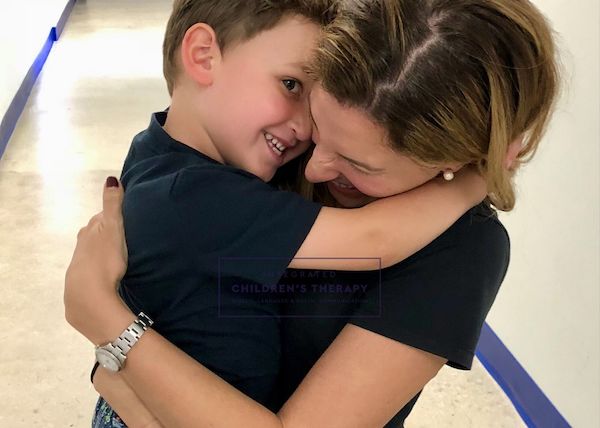One of our main goals at Integrated Children’s Therapy is helping children develop the social communication skills needed to enjoy the hallmarks of being a kid, like connecting with those around them, making friends, and playing with others.
Gratitude supports social communication because it helps us understand others’ feelings (perspective-taking), practice empathy, and learn the social power of kindness and appreciation. It also supports emotional development as we notice what makes us feel good, and take time to focus on it.
Plus, gratitude is good for you! Research shows that it boosts chemicals in our brain that not only make us feel happier, but also make social interaction more enjoyable. It opens the door to new relationships and makes existing ones stronger. People with daily gratitude habits are healthier, more empathic, have higher self-esteem, and even sleep better.
ICT Speech-Language Pathologist and Yoga Instructor Jacki Rubin saw how teaching gratitude can benefit social and emotional learning when she introduced it as a theme-of-the-week during summer camp yoga classes with 4-7 year-olds.
“At that age,” she says, “gratitude is still an abstract concept, so I used questions like ‘What makes you feel good?’ and ‘Who are you thankful for?’” Concrete questions helped the children explore emotions linked to happiness, love and appreciation.
“The exercise was also a great way to bring awareness to good things in the children’s lives,” says Jacki. “When you’re dealing with developmental challenges the focus easily lands on what’s wrong and how to make it better, so this was a way to teach them to also focus on the good things they already have.”
As a parent, you can also teach your child about gratitude, and it’s never too early to start. Long before they truly grasp the concept (sometime around 8 years old), you can lay the groundwork for a daily gratitude habit.
How to Build Gratitude into Your Child’s Day
Model it.
Modeling is your number-one tool for teaching your child. Let him see you thanking people. Let him overhear you expressing appreciation to your partner, another family member, or a friend. Say things like, “I’m so thankful for this beautiful weather. It makes me feel happy!”
Be consistent with “thank-you.”
If you have a little one, remember that before children learn to say these words, they learn to understand them. If your child brings you a toy, offer an enthusiastic “Thank you!” As he gains speech, encourage him to say it, too. As his language skills expand, teach him to use it in a full sentence: “Thank you, Mommy, for getting my cup.”
Make receiving special.
Get your child into the habit of not getting a little something every time you go to the supermarket, or picking out a toy for himself while shopping for a friend’s birthday. This will make the act of receiving feel more special and easier to appreciate.
Involve him in giving.
Have him help you pack up outgrown clothes and toys for charity. Talk about how happy other children will be to receive them. This teaches him to appreciate what he has and the value of sharing it with others.
Talk about things you’re grateful for.
You can do this in the car, at dinnertime, bedtime, or anytime you’re not distracted by other activities. Study after study has shown that adults who list things they’re grateful for every day are happier. Tell your child something you’re thankful for and ask him to tell you something, too. If he needs help, you can prompt him: “What is something good that happened today? What’s something that makes you feel happy? What’s your favorite toy? Who is a good friend?” For children with social communication challenges, bringing relationships into this conversation is a great way to support learning about things that make interacting with others successful.
Work it into younger children’s play.
Sprinkle gratitude into pretend play. When your child invites you to his restaurant and prepares you an elaborate meal with toy food, be sure to express how good it feels to eat delicious food, and tell him how much you appreciate his efforts.
The best part of about focusing on gratitude with your child? You get to reap the powerful benefits of daily thankfulness, too.
Happy Thanksgiving from all of us at ICT!


Recent Comments